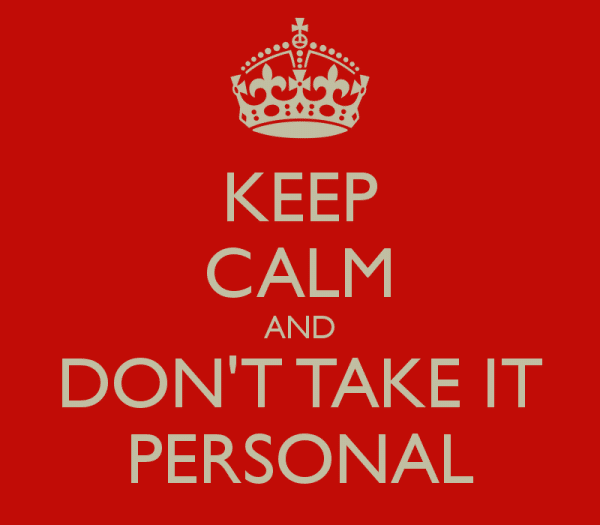How do I handle criticism?
Summary:
Don’t take anything personally in the clinical environment. It’s stressful and everyone is under tremendous pressure. Always take a step back and look at the bigger picture, and remind yourself why you’re in medical school. You’re there to LEARN. If you never received feedback or corrections, you wouldn’t be learning anything! Nobody likes criticism, but you must come to accept that it’s a natural part of the learning process, and you need these things pointed out to you sooner rather than later. You will make mistakes! It’s OK! Learn from them, correct them if possible, and move forward.

“Don’t take things personally”
Remember this mantra for this phase of your learning: “It’s not about you.” There are emergencies where you might be in the way of the team and people didn’t have time for normal pleasantries. You are still new to the environment so you are not going to be perfect as you learn. Also, patient encounters can be challenging… People are often tired from a long shift. The clinical environment is a stressful place for everyone.
While outright abusive behavior is never to be condoned or accepted, students within this environment may be challenged or criticized in a way that they are not used to. This can cause lingering negativity and stress. In these situations, students should take a step back to see the larger context of the situation, which may allow them to obtain a degree of equanimity about the situation. Keep in mind that you’re in medical school to not only learn everything about the medical sciences, but also to learn how best to handle patients and other people you work with. A well-rounded physician requires skills in both aspects.

“Know why you are in medical school”
If you encounter an overly-critical attending or a resident who has no patience for teaching and/or guiding you, your energy may be drained in those situations. Remember that although a day, a week, or even a rotation might not go the way you want, nothing lasts forever. Soon you will be done with this particular situation and move on. In the meantime, what can the situation teach you about dealing with challenging people and situations? This may be a situation in which you have to remind yourself WHY you’re in medical school. Be confident that this is where you are supposed to be. Don’t be afraid to use your interactions with patients for inspiration or guidance… They are just as much your teachers as the medical professionals you work with, and there is an abundance of knowledge/wisdom for you to learn from them.
“You’re there to learn”
What if you went through your rotation and nobody corrected you on anything? What if you received no critical feedback? Is that actually a good thing? Will that make you a better doctor? While no one likes to be criticized, criticism often leads to the greatest learning. Throughout your rotations you will feel like you know a good amount because of your preclinical training, but there is so much that you don’t know yet… And that’s OK! You will be learning new information in a completely new way during your clerkships, including how to conduct yourself as a physician when interacting with patients and within the healthcare team. Remember, you are there to learn, and in learning, criticism is often your friend. Making mistakes is actually a part of the learning process…
“Acknowledge your mistakes.”
It’s important to show a certain level of maturity as a learner. You will inevitably make someone upset. You will inevitably make mistakes. It happens. What will distinguish you is an ability to own up to your mistakes, learn from them, and move on. Don’t dwell on your mistakes or let them define you. Forgive yourself and start anew each day and each shift.
“Each day, forgive yourself”
Reflect on your experiences, both positive and negative. Think about how you conducted yourself during those experiences. Now think about how you would do things differently if given another opportunity, and how you will try to be better. Perhaps even more importantly, think about the things you did well. (It is predictable for a medical student to fixate on the mistakes he/she made without simultaneously acknowledging major accomplishments…) Did you surprise yourself? How did your patients/preceptors react? You should always strive to do better, but don’t forget how far you’ve come. Focus more on the good than the bad! Acknowledge it, correct it, and move forward in a positive manner.

Resources:
Previous Pain Point: How do I stand out in my clerkships?
Next Pain Point: How do I properly study for the shelf exam during rotations?